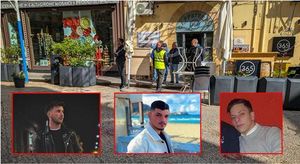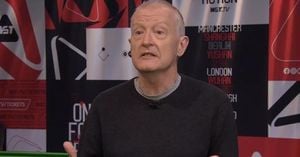Southampton is gearing up for some significant activity this week as the city sees the organization of anti-racism demonstrations against far-right protests scheduled for Wednesday night. This series of events follows the tragic stabbing of three young children, which, according to reports, has sparked unrest and drawn out various groups eager to voice their concerns. Amid the tension, activists and community leaders are working to promote messages of solidarity and peace.
The counter-protest, coordinated by the Southampton chapter of Stand Up To Racism, is set to commence at 7 PM at The Peace Fountain located at East Park. This rally aims to challenge the far-right demonstrations planned for the same evening, as organizers recognize the potential for violence erupting from such confrontations. A post shared on Facebook by the organization reflects this sentiment, noting, "There is a potential for the far-right to escalate this, prioritizing safety is key. If you do not feel comfortable, avoid the area from 7 PM onwards." They are preparing to create a strong visible opposition to hate, all the more necessary following the tragic events on the nation’s radar.
There’s no denying the atmosphere is charged. Two specific demonstrations have been made public through platforms like Telegram, indicating organized meetings by far-right groups intending to rally within the city center. A recent Telegram post urged participants to cover their faces and suggested gathering for the cause. This has understandably raised alarms among community leaders and residents, who fear the potential for violence.
Religious leaders and advocates are expressing their hope for the situation to remain peaceful. Conversations with community members reveal fears about the possibility of clashes between opposing factions. A statement from Southampton Stand Up To Racism captures this urgency. They say, "We do not want to see unrest; our city deserves better than violent displays of hatred." Their counter-protest is being marketed as part of broader efforts to unite against racism and promote inclusivity, especially significant after their recent successful march during Refugee Week, where participants donned banners reading "refugees welcome" as they paraded through the city.
Looking forward, some members of this community anticipate even more action, as additional demonstrations are being organized for next weekend. Insensitive invitations have called participants to wear national team shirts and wave St. George’s crosses, alluding to patriotism but also stirring unease among those who fear these symbols can incite division. To compound these tensions, similar protests are cropping up across the South, such as one also set for Portsmouth on the same night. These neighboring events amplify worries of potential street violence and disruption.
Southampton has been no stranger to upheaval. Over the past few years, various protests have emerged, targeting different societal issues, from Brexit to immigration. Activist groups have risen, and tensions have often culminated in confrontations between polarizing views. This latest wave of demonstrations stands out due to its tied emotional context; the recent violent events have overshadowed the community's ability to engage with such sensitive matters peacefully.
Consequently, local religious and community leaders face the delicate task of facilitating dialogue. Their efforts to advocate for peace come against the backdrop of hurt and anger felt by many residents, especially by those impacted by recent events. Utilizing their platforms as places of sanctuary, advocates are trying to offer solace and encourage people to channel their energy constructively rather than destructively. Some community members too acknowledged the fine line between passionate protest and aggression, and many locals seem to resonate with this message. They see the need for solidarity and compassion, organizing peaceful demonstrations rather than succumbing to hateful rhetoric.
Southampton's complex dynamics encapsulate broader societal changes occurring across the UK, Nation-wide, similar protests and counter-protests are causing many to ponder how communities can bridge divides. Residents urge leaders to prioritize unity and to push against the current polarized climate. What makes Southampton’s response unique is how swiftly the community is rallying, fostering dialogues amid fear and uncertainty.
Even with these heightened emotions, many are clinging to hope. Local forums are popping up, where dialogue flows freely, allowing for exchanges – sometimes heated – around difficult topics. Young voices are stepping up, motivated to change narratives and perceptions, becoming increasingly aware of their roles and responsibilities. They are becoming the new faces of activism, choosing to unite rather than divide. For many, this upcoming week is about more than just protesting; it’s about reclaiming community identity and learning the art of collective dissent.
The counter-protest organized by Stand Up To Racism is tapping directly to these sentiments, reminding us all of the continued fight against racism and intolerance. They hope to send out clear messages: hate has no home here. But perhaps what remains critical are the conversations sparked by these protests, which may lead to lasting change if nurtured properly.
Residents should prepare for discussions on what tolerance looks like within their community. Many people have reached out to local leaders, voicing their opinions and sharing personal stories about their experiences with racism. These narratives are what activists hope to connect through peaceful dialogue. For Southampton, then, this week isn’t just about counter-demonstrations; it’s about bringing the community back to the heart of its values, choosing solidarity rooted deeply against hate.



